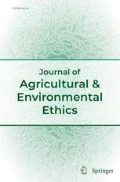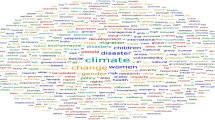Abstract
Environmental philosophies concerning our obligations to each other and the natural world too rarely address the aftermath of environmental injustice. Ideally we would never do each other wrong; given that we do, as fallible and imperfect agents, we require non-ideal ethical guidance. Margaret Walker’s work on moral repair and Annette Baier’s work on cross-generational communality together provide useful hermeneutical tools for understanding and enacting meaningful responses to intergenerational injustice, and in particular, for anthropogenic climate change. By blending Baier’s cross-generational approach with Walker’s emphasis on victim subjectivity and moral repair, I propose that a reparative model of intergenerational justice can provide some much needed direction on non-ideal moral issues comparatively neglected in climate-ethics debates today.
Similar content being viewed by others
References
Almassi, B. (2012). Climate change and the ethics of individual emissions: A reply to Sinnott-Armstrong. Perspectives, 4, 4–21.
Almassi, B. (2017). Ecological restorations as practices of moral repair. Ethics & The Environment, 22(1) (forthcoming).
Baier, A. (1981). The rights of past and future persons. In E. Partridge (Ed.), Responsibilities of future generations (pp. 171–183). New York: Prometheus Books.
Baier, A. (1986). Trust and anti-trust. Ethics, 96(2), 231–260.
Barrett, S., Speth, R., Eastham, S., Dedoussi, I., Ashok, A., Malina, R., et al. (2015). Impact of the Volkswagen emissions control defeat device on US public health. Environmental Research Letters, 10(11), 1–10.
Barry, B. (1999). Sustainability and intergenerational justice. In A. Dobson (Ed.), Fairness and futurity (pp. 93–117). Oxford: Oxford University Press.
Bello, E., & Salm, J. (Eds.). (2016). Citizenship, restorative justice and environment. Rio de Janeiro: Lumen Juris.
Boxill, B. (1972). Morality of reparation. Social Theory and Practice, 2, 113–123.
Card, C. (2004). The atrocity paradigm revisited. Hypatia, 19(4), 210–220.
Chossiere, G., Malina, R., Ashok, A., Dedoussi, I., Eastham, S., Speth, R., et al. (2017). Public health impacts of excess NOX emissions from Volkswagen diesel passenger vehicles in Germany. Environmental Research Letters, 12(3), 1–14.
Emmerman, K. (2014). Sanctuary, not remedy: Inter-animal moral repair and the problem of cap-tivity. In L. Gruen (Ed.), The ethics of captivity (pp. 213–230). Oxford: Oxford University Press.
Gardiner, S. (2009). A contract on future generations? In A. Gosseries & L. Meyer (Eds.), Intergenerational justice (pp. 77–118). Oxford: Oxford University Press.
Gardiner, S. (2011). A perfect moral storm. Oxford: Oxford University Press.
Haalboom, B., & Natcher, D. (2012). The power and peril of ‘vulnerability’. Artic, 65(3), 319–327.
Hiller, A. (2011). Climate change and individual responsibility. The Monist, 94(3), 349–368.
Hiskes, R. (2009). The human right to a green future. Cambridge: Cambridge University Press.
Holmgren, M. (2012). Forgiveness and retribution. Cambridge: Cambridge University Press.
Holtgren, M., S. Ogren, & K. Whyte. (2015). Renewing relatives: One tribe’s efforts to bring back an ancient fish. Earth Island Journal 30(3).
MacLachlan, A. (2008). Forgiveness and moral solidarity. In S. Bloch-Shulman & D. White (Eds.), Forgiveness: Probing the boundaries (pp. 3–16). Oxford: Inter-Disciplinary Press.
Meyer, L. (2015). Intergenerational justice. Stanford Encyclopedia of Philosophy.
Mouawad, J., & C. Jensen. (2015). The wrath of Volkswagen’s drivers. New York Times.
Nolt, J. (2011). How harmful are the average American’s greenhouse gases? Ethics, Policy, and Environment, 14(1), 3–10.
Norlock, K. (2009). Forgiveness from a feminist perspective. Lanham, MD: Lexington Books.
Norlock, K. (2010). Forgiveness, pessimism, and environmental citizenship. Journal of Agricultural and Environmental Ethics, 23(1–2), 29–42.
Posner, E., & Weisbach, D. (2010). Climate change justice. Princeton: Princeton University Press.
Rogers, C., & E. Sylers. (2015). VW’s customers feel confusion, remorse. Wall Street Journal.
Ross, R. (2006). Returning to the teachings: Exploring aboriginal justice. Toronto, ON: Penguin.
Schott, R. (2004). The atrocity paradigm and the concept of forgiveness. Hypatia, 19(4), 202–209.
Shue, H. (1999). Global environment and international inequality. International Affairs, 75(3), 531–545.
Sinnott-Armstrong, W. (2005). It’s not my fault: Global warming and individual moral obligations. In W. Sinnott-Armstrong & R. Howarth (Eds.), Perspectives on climate change (pp. 221–253). Amsterdam: Elsevier.
Stoy, A. (2015). Why VW’s betrayal with diesel engines is different. Automotive News.
Taylor, P. (1986). Respect for nature. Princeton: Princeton University Press.
Thompson, J. (2002). Taking responsibility for the past. Cambridge: Polity Press.
Thompson, J. (2009a). Intergenerational justice. New York: Routledge.
Thompson, J. (2009b). Identity and obligation in a transgenerational polity. In A. Gosseries & L. Meyer (Eds.), Intergenerational justice (pp. 25–49). Oxford: Oxford University Press.
Walker, M. (1998). Moral understandings: A feminist study in ethics. New York: Routledge.
Walker, M. (2001). Moral repair and its limits. In T. Davis & K. Womack (Eds.), Mapping the ethical turn (pp. 110–127). Charlottesville, VA: University of Virginia Press.
Walker, M. (2006a). Moral repair. Cambridge: Cambridge University Press.
Walker, M. (2006b). Restorative justice and reparations. Journal of Social Philosophy, 37(3), 377–395.
Walker, M. (2010). What is reparative justice?. Milwaukee, WI: Marquette University Press.
Walker, M. (2013a). Moral vulnerability and the task of reparations. In C. Mackenzie, W. Rogers, & S. Dodds (Eds.), Vulnerability (pp. 111–133). Oxford: Oxford University Press.
Walker, M. (2013b). Third parties and the social scaffolding of forgiveness. Journal of Religious Ethics, 41(3), 495–512.
Walker, M. (2013c). The expressive burden of reparations. In A. Maclachlan & A. Speight (Eds.), Justice, responsibility and reconciliation in the wake of conflict (pp. 205–225). Dordecht: Springer.
Weiss, E. (1992). In fairness to future generations and sustainable development. American University International Law Review, 8(1), 19–26.
Acknowledgments
Earlier versions of this paper were presented at meetings of the International Society for Environmental Ethics in February 2015 and the Midwest Political Science Association in April 2016; my gratitude to conference organizers, commentators, and participants, including Allen Thompson, Jonathan Schwartz and John Edward Davidson. Thanks also are owed to Negin Almassi, Karen Emmerman, Kate Norlock, and Joao Salm for productive and challenging conversations on environmental repair and reparative justice. Any and all errors are mine alone.
Author information
Authors and Affiliations
Corresponding author
Rights and permissions
About this article
Cite this article
Almassi, B. Climate Change and the Need for Intergenerational Reparative Justice. J Agric Environ Ethics 30, 199–212 (2017). https://doi.org/10.1007/s10806-017-9661-z
Accepted:
Published:
Issue Date:
DOI: https://doi.org/10.1007/s10806-017-9661-z




